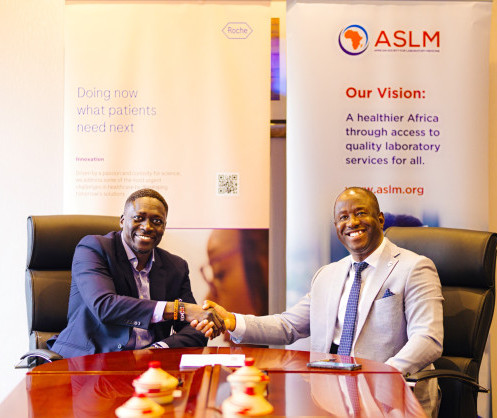Roche will provide funding, technical support and global platforms for visibility while ASLM will lead country-level implementation, stakeholder coordination and curriculum development
- The partnership dubbed, Leadership Excellence for African Diagnostics (LEAD) between Roche and ASLM is a three-year programme to strengthen lab leadership in Africa
- The initiative focuses on mentorship and training to build lab leadership capabilities
Roche Diagnostics Africa (www.Roche.com) and the African Society for Laboratory Medicine (ASLM) (www.ASLM.org) have announced the launch of a three-year partnership to elevate laboratory leadership and improve access to quality diagnostic services across the continent. The initiative — titled LEAD: Leadership Excellence for African Diagnostics — brings together health ministries, laboratory directors, academic partners and technical experts to develop a new generation of capable, connected and future-ready lab leaders.
” This partnership will build long-term leadership that would shape the future of diagnostics in Africa — practically, strategically and sustainably “
“This partnership will build long-term leadership that would shape the future of diagnostics in Africa — practically, strategically and sustainably. In a time where we need African healthcare systems to become less reliant on external funding sources, we are focused on increasing domestic diagnostics capacity more than ever,” says Dr Allan Pamba, Executive Vice President, Diagnostics, Africa, at Roche Diagnostics.
“We are entering a new chapter where African health systems take the lead in their own transformation. By growing diagnostic leadership we support long-term resilience and impact. LEAD equips professionals who can influence policy, drive national strategy and build sustainable healthcare capacity.”

Under the partnership, LEAD will deliver a series of integrated interventions including baseline leadership assessments to guide a tailored context-specific training approach, development of a pan-African curriculum in collaboration with a leading academic institution, structured mentorship and professional development for emerging lab leaders, peer learning and regional collaboration through workshops and best practise exchanges.
ASLM Chief Executive Officer, Nqobile Ndlovu, added: “Diagnostics are the foundation of resilient health systems – but strong labs require strong leaders. LEAD focuses on people: their vision, their reach and their ability to transform public health from within. With this programme, we are supporting the leadership needed to move African healthcare forward.”
Roche will provide funding, technical support and global platforms for visibility while ASLM will lead country-level implementation, stakeholder coordination and curriculum development.
Laboratory strengthening is a key enabler for stronger health systems and this partnership is a commitment towards a healthier future for Africans.







OTHER ARTICLES
Editorial — Prevent, inform, and act for women’s health in Africa
Kenya : Government Prioritises Maternal Health and Strengthens Support for Community Health Promoters
Strengthening pandemic prevention, preparedness, and response capacities in Senegal using the “One Health” approach